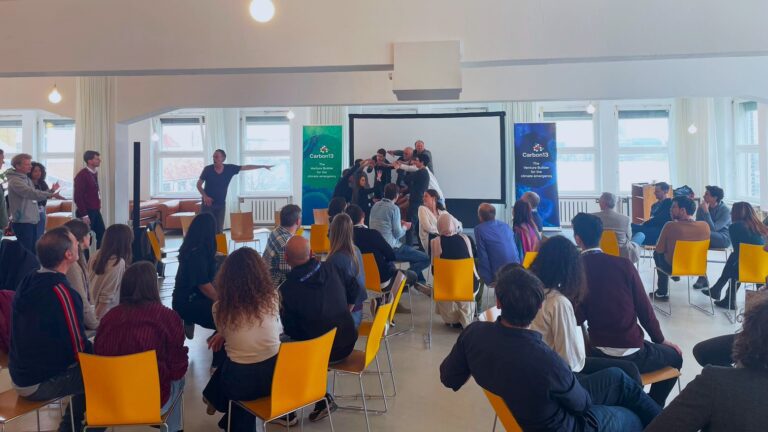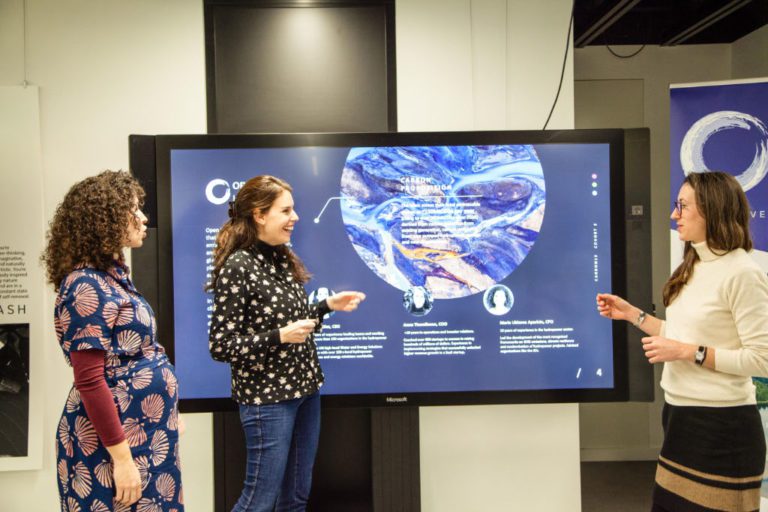We need more women in climate tech:
Meet some of the female founders on the journey to develop breakthrough innovation.
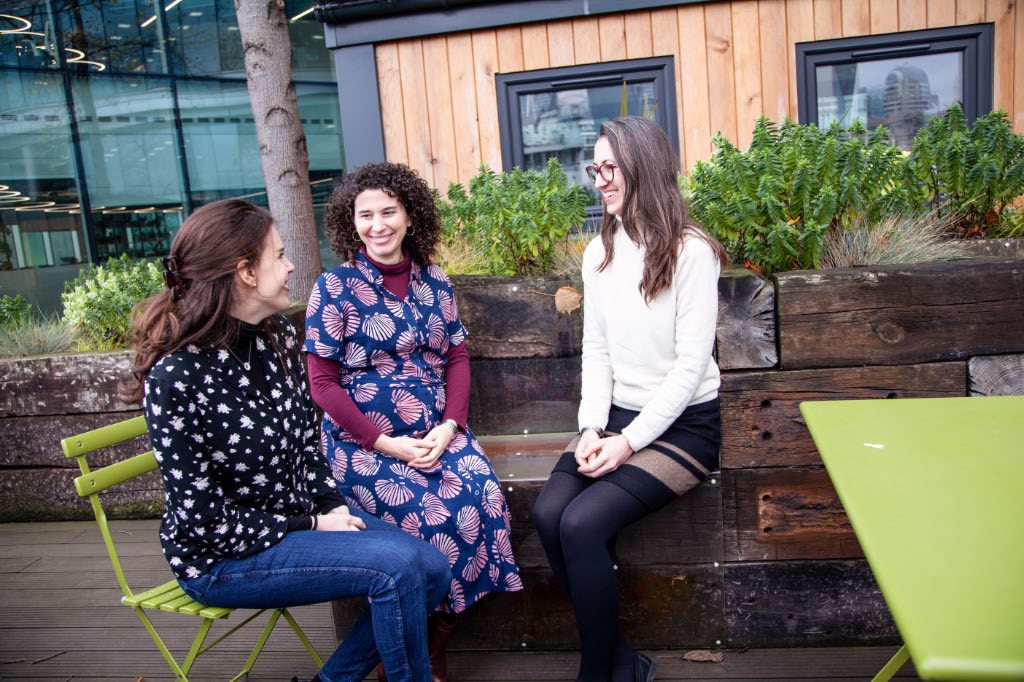
Cristina, Maria and Anna of Open Hydro before the Carbon13 Climate Innovation showcase at EY in December 2022.
Twitter
LinkedIn
One of Carbon13’s core beliefs is that diversity enables breakthrough innovation of the kind the planet needs. So, this IWD, hear directly from those women who have chosen to dedicate themselves to creating a positive climate impact. Below you’ll find what drew our female founders to climate tech and entrepreneurship as well as an exclusive insight into the stories of three founders: Nicky Dee, our Chief Innovation and Sustainability Officer, Louise Parlons Bentata, co-founder of Bluemethane and Frankie Fox, co-founder of Foodsquared. Lastly you will find a range of resources that each of the female founders recommend for anyone wanting to develop their entrepreneurial skills. Alternatively, if you are, or know, a potential future female founder then have a conversation with one of the women at Carbon13 to understand more.
Email Carbon13
We need a diverse brain force in science to overcome the many challenges ahead of us. Becoming an engineer was one of the best choices in my life because it has provided me with the tools to strengthen my analytical and strategic thinking and ultimately led me to co-found Open Hydro with two other amazing women

Cristina Diez
OpenHydro
Testimonials from our climate tech founders
“If you’re a mum your life is a hustle without somebody telling us that you should be sitting at a computer till your eyes drop out. So, the ecosystem is super important.” Frankie Fox, Foodsquared
“It’s doing what I love to make the world a better place for everyone else. For climate tech to have maximum impact, it needs a diversity of founders who represent all set to benefit from it.” Sioned Owen, Unbound Energy
“I was drawn to climate tech entrepreneurship because of the outsized impacts that I could potentially have as an individual, in a way that leverages my skills and passions.” Katelyn Prendiville, SeedCulture
“I had a lightbulb moment during lockdown! After the CISL Business Sustainability Management course, I stumbled on Carbon13 which felt like the best place to make use of my experience and desire to make a significant positive impact on climate change.” Susan Gregory, Insenti
“Being an engineer I have always wanted to build things for amplifying Mother Nature not against her.” Joyeeta Das, SamudraOceans
“I’m one of many people who treasures nature, equality and our shared future, so I knew that I had to align my career around these values. Climate Tech was a natural choice in this sense.” Josephine Bromley, Mortar.IO
“As women we often do not choose STEM higher education subjects to know the technologies that can be used to solve the biggest climate problems but Carbon13 was exactly what I needed to find the team who knows the tech, and I bring the business acumen that we need to scale.” Anna Thomlinson, OpenHydro
“I decided to devote my career to fighting the climate crisis, and Carbon13 provided an ideal launchpad to do that. One of the hardest parts about starting a company is finding a cofounder, and Carbon13 brought together incredibly intelligent and motivated people.” Natalia Dorfman, Kita
“Women are more affected by climate change, yet less than 1/5 green startups have at least one female founder. Women’s perspective is lacking. We need initiatives that encourage all genders –everyone- with a particular drive to recruit women.” Louise Parlons Bentata, Bluemethane
Imposter syndrome, climate tech communities and entrepreneurship
With our partners EY, Kim Paykel, UK Sustainability Leader at EY, interviewed Nicky Dee, our Chief Innovation and Sustainability Officer, Louise Parlons Bentata, co-founder of Bluemethane and Frankie Fox, co-founder of FoodSquared about their journey to becoming a founder in the climate tech world. You can watch the full interview here but below are some of their insights as to how they became interested in and joined the climate tech world.
How did this journey as a female founder climate entrepreneur start for you? What led you to start a climate business?
Nicky:
I can’t really remember an aha moment. Historically entrepreneurship and sustainability haven’t had neat career paths. I grew up on an old farm on an island and used to play outside a lot with my sisters. I have a huge appreciation of nature which meant I just found it mindboggling that we weren’t looking after it better. So, as soon as I started hearing about anything to do with the climate crisis it became a real conundrum to me as to why we weren’t doing anything about it.
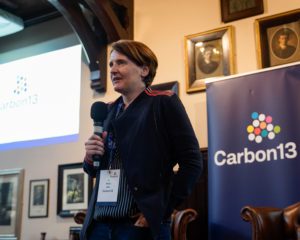
Nicky Dee, Carbon13
Long story short, I ended up doing some marine conservation work in the Philippines and it was great. […]But I really… I came back, and I said “OK” – excuse my language – “but we have to get our own shit in order”. So, I abandoned marine conservation as a career path. When I returned I did some temping do recover my finances and accidentally started working at something called the Cambridge Entrepreneurship Centre and that I suppose is my aha moment – sustainability needs change and entrepreneurs are great at change – how do we bring these two things together.
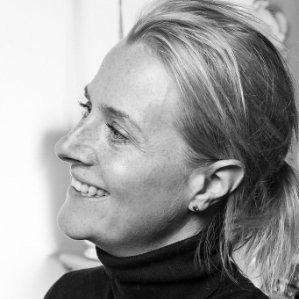
Frankie Fox, FoodSquared
Frankie: My father is a mushroom expert, so I was brought up foraging, growing our own food so very much close to the soil and to nature. When my father died, I felt this huge, I guess burden almost, to pass on what I’d learnt from him to my children. I guess that started my first business: the Foraging Fox. We started growing fruit and vegetables in the garden and actually ended up making – this sounds bizarre – beetroot ketchup from a glut of apples and beetroots we had in the garden. Because Ketchup was something my kids ate, and beetroot was something I had. So, we started blind tasting it, taking it round people’s houses, and then little shops and so we actually started a business from there and it was a… it was a great journey.
I learnt a lot. I didn’t have a background in food, I was actually at PwC. I did international tax, so I started in European law and then went to international tax and went from there into ventures and into banking. When I had children and I wanted to spend time with them, especially after my father died. The business grew organically. I had a fantastic co-founder, but I think I got to the point where I felt like in the food system there’s some real problems. I felt like I was part of the problem not the solution. Thankfully we got some investors on. My Co-founder said: “could you take it forward?”. I needed to have a really big think about what I wanted to do next. So, I did a course in sustainability, and realised how little I knew, but I still felt this huge urgency to do something about it. That’s when I joined Carbon13, met some like-minded co-founders and we started a business that focused on the food system, alternative proteins being one of the big the big ticks on the dial if you’re going to go to net zero. We’ve got a bioengineer, we’ve got a waste expert and then my background in food and we’ve spent the last year creating a business that that we feel will really, truly have purpose. I think… you know it is tough having a business but actually if you’ve got a really overarching purpose, you know right down to your DNA
Louise: So, my background is not on a farm or really deep in nature, my background is vision marketing at L’Oreal and Johnson & Johnson and then I ran my marketing consultancy for about 10 years. One of those clients was a manufacturer of highly engineered widgets and I thought: so, we shouldn’t be throwing them in the ground all the time. So, I offered to him that I do the project. He said, “no you can’t do that because you’re not qualified” and I said, “what makes me to be qualified?” and they brought in this this lady, and I asked: “what makes you qualified?”. She said, “well, I’ve just done the training course in the Cambridge Institute of Sustainable Business Leadership” and this is my first project”. So, I thought ‘right I’ll do that course’, and in one of the final lectures, Nicky was a lecturer and I saw the Carbon13 logo on the bottom and thought ‘I wonder what that is’. I came out of that and realised, I don’t want to go back to marketing strategy now I understand more about contextualising this problem and I have to do something bigger than solving their circularity problem. I’ve never really minded what the thing is that I’m solving just that it matters and that I like the people in solving it with.
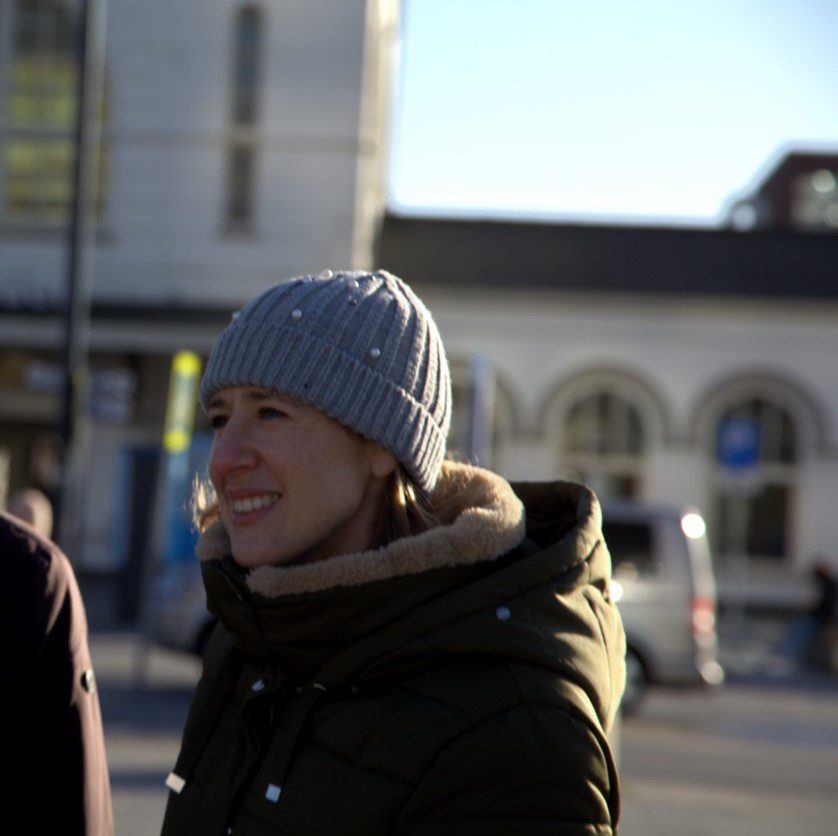
Louise Parlons Bentata, Bluemethane
Events, talks and resources recommended by Carbon13 female founders
ClimateRaise raises the profile of female founders and their ventures.
Joyeeta’s group and platform called SuperPitch women founders where women can ask for advice on anything in complete anonymity. They organise fundraising events, are often mentored by the biggest names in VC and are over 5 years old as a group. Joyeeta says “I find this group to often have high trust ratings by the members and I personally made this space as I found it lacking for women founders. I wanted a safe space where we are not judged, where all topics are welcome and it is not just about selfies and cocktails but actual sharing and empathy of various life situations.”
London Climate Connection, a female-founder organisation.
My Climate Journey community, which has events and resources especially for female founders looking to move into Climate Tech.
ICE Home (theicelist.com) It has a female founder’s telegram group which is great for all questions and celebrating success.
The LeanIn website and book by Sheryl Sandberg. Lean In Book – Lean In
The podcast ‘How to save a planet‘ was created by Dr. Ayana Elizabeth Johnson and Alex Blumberg. Each episode tackles a different aspect of ways to save our Earth.

